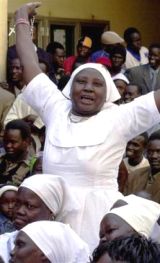Churches to promote democracy in south Sudan
By Stephen Mbogo
NAIROBI, Kenya, Feb 11, 2005 (CNSNews.com) — African churches are gearing up to teach people in war-ravaged southern Sudan about democracy and human rights to better prepare them for the changes ahead, now that the 24-year civil war has been declared over.

|
|
An unidentified Sudanese refugee nun reacts Jan. 28, 2005, at the Sakakini Sacred Heart Community Church in Cairo, Egypt, during a celebration of the Jan. 9 southern Sudan peace treaty signing. (AP). |
Teaching southerners civic education will enable them to “own” the peace process, demand accountability of their leaders and guard against further human rights abuses, church leaders said here.
“The churches have a responsibility to start civic education immediately,” Meloki Kifle of the World Council of Churches said at a dialogue forum in Nairobi involving churches from Sudan and the wider continent.
A comprehensive peace agreement to end the war between Christian and animist black African southerners and the Arab Islamist regime in Khartoum was signed on January 9.
Under the deal, six years of interim government will be followed by a referendum to decide whether the south should succeed or remain part of a unitary state with the rest of Sudan.
Kifle said a priority in southern Sudan was to help people make an informed choice when the time arrived for the referendum.
He voiced concern that the southern Sudanese, marginalized for almost four decades, may not be in a good position to make such choices.
Two million people died during the war and millions more live as refugees in neighboring countries.
One of the legacies of the war was the enslavement of many southerners, particularly women and children, who were abducted by government-sponsored militias and taken north to work for Arab masters. There, they face forced labor, rape, and forced Islamization, according to campaigners.
Last month, the human rights group Christian Solidarity International (CSI) helped some 880 slaves from the north to win their freedom, although local leaders say more than 80,000 more remain under oppression.
The Rev. John Tong Puk, chairman of the Sudan Council of Churches, said because of injustices inflicted by northerners, African churches would need to help promote good Christian-Muslim relations in the south, to ensure smooth implementation of the peace agreement.
“We have Muslims in the south whom we cannot abandon,” he said. “We must move together.”
The leaders agreed to initiate dialogue between Christian and Muslim leaders in the south.
Puk said with refugees returning to their villages, the challenge of resettling them and assisting in demobilizing and integrating former combatants into society was overwhelming.
“What we need are the resources. People who have been assisting us, like the Americans, must keep that assistance flowing,” he pleaded.
In another development, the U.N. is due to send a peacekeeping force to Sudan.
Secretary-General Kofi Annan has proposed a 10,000-strong force to be deployed under Chapter 6 of the U.N. Charter, meaning the peacekeepers will be able to use force to protect people directly threatened with violence.
The force will provide humanitarian assistance, help protect women’s rights, demobilize child soldiers, tackle the mine problem and raise awareness of HIV/AIDS.
Annan’s proposal is yet to be approved by the Security Council.
